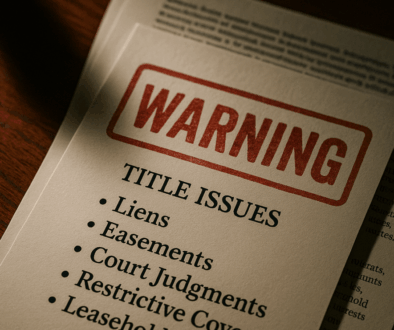Peace of mind starts with one crucial step: the Title Search
When it comes to buying or selling real estate in British Columbia, one of the most important yet often misunderstood steps is the title search. It sounds like a formality—and in many cases, it is. But when it’s not, it can be the difference between a smooth transaction and a costly legal mess.
So what exactly is a title search?
A title search is a review of a property’s legal ownership history and any registered charges or interests that affect it. This includes things like mortgages, liens, easements, covenants, and even judgments against the current or previous owners. It’s like running a background check on the property before committing to the deal.
A Brief History
The concept of land title tracing back ownership isn’t new. It dates back hundreds of years, evolving from handwritten registries in old British common law systems to the current land title system we use in BC today. Here in British Columbia, we operate under the Torrens system, which means the Land Title Office guarantees the accuracy of its title registry—something not all provinces or countries do. So when something appears on a BC title, it holds legal weight.
Why It’s Important
For buyers, the title search confirms that the seller actually owns the property and has the right to sell it. It also reveals any encumbrances or issues that might affect how the property can be used. For example, a utility right-of-way might run through the backyard, preventing you from building a pool. Or worse—there could be an outstanding lien from a contractor who was never paid.
For sellers, a title search ensures there are no surprises that could delay or derail the transaction. It’s also a chance to clean up any outdated or discharged charges that should have been removed from the title years ago but weren’t. You’d be surprised how often this gets missed.
How It’s Done
Usually, a title search is ordered by your Realtor, lawyer, notary, or in some cases, a title insurance provider. The search is conducted through BC’s Land Title and Survey Authority (LTSA), where every parcel of land has a unique PID (Parcel Identifier). The search returns a title summary listing the current registered owner(s), legal description of the property, and any active charges or interests.
From there, each registered charge can be pulled up individually and reviewed. Some are routine—like a mortgage from a major bank. Others raise red flags. Look out for:
- Builder’s liens
- Court judgments
- Rights-of-way or easements that weren’t disclosed
- Restrictive covenants limiting future development
- Leasehold interests
What to Watch Out For
Don’t assume a “clean” title just because the house looks perfect. Even strata properties can carry surprises—like a blanket easement over the whole development or a covenant restricting rentals. This is why a title search isn’t just a checkbox. It’s a layer of protection for everyone involved.
Bottom Line
Whether you’re buying your first condo or selling a detached home, the title search is one of those behind-the-scenes steps that can have very real consequences. When reviewed early and properly, it brings peace of mind. And in real estate, peace of mind is everything.





